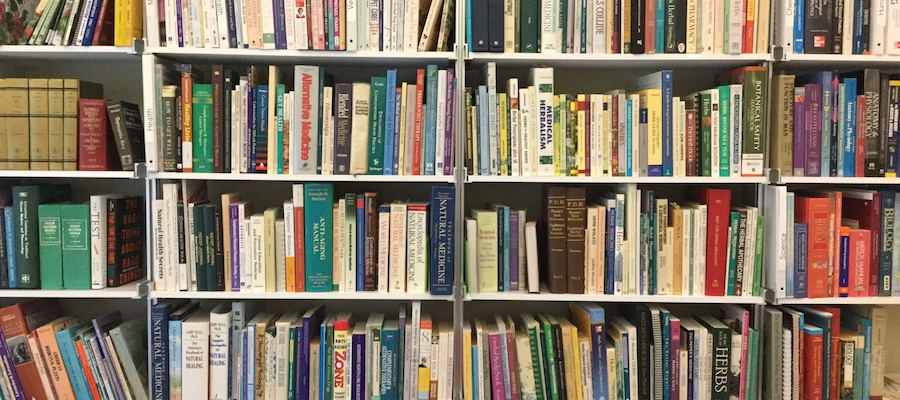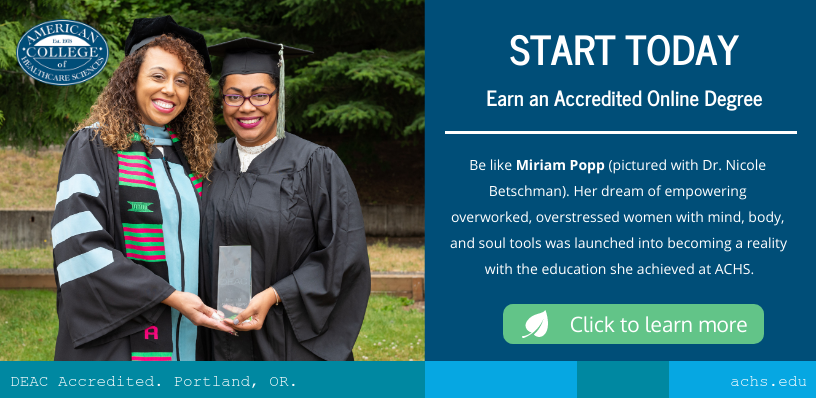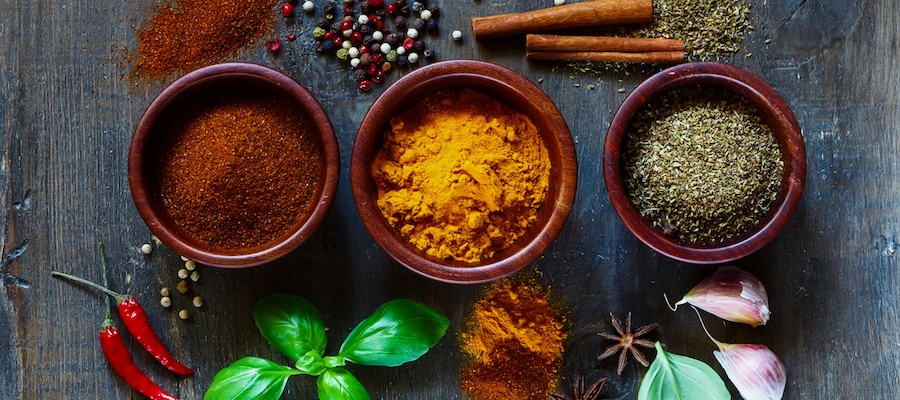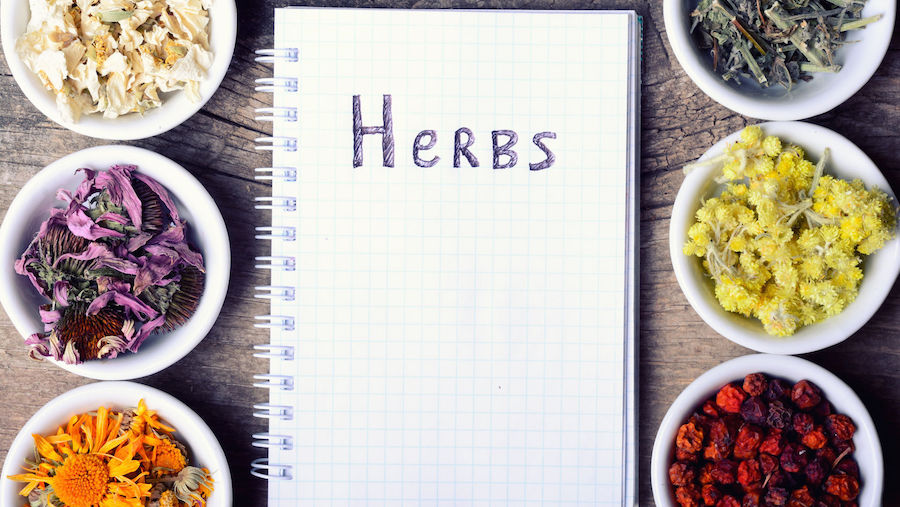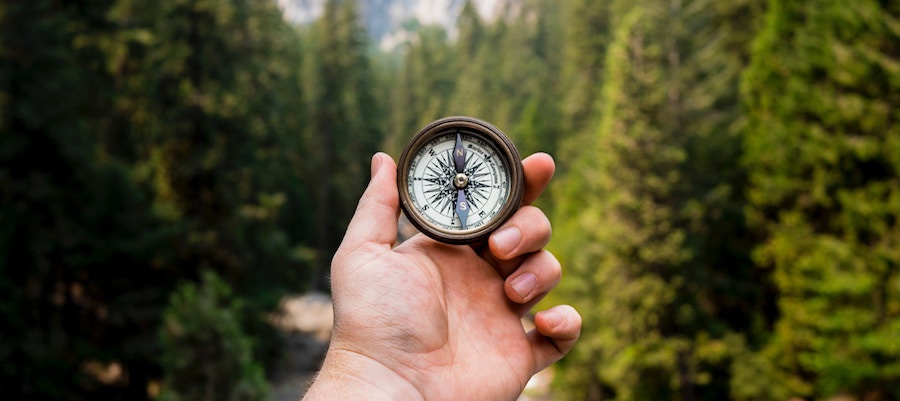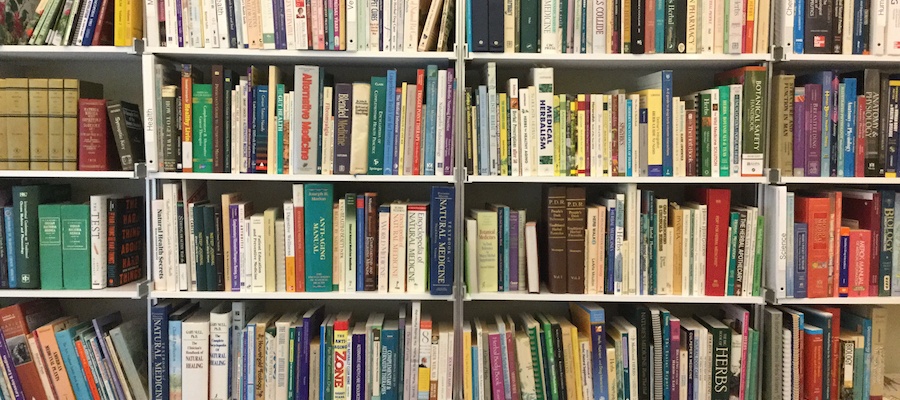
I love books. It’s a passion I learned from my mother who was never without a book to read.
When I was a student of Traditional Chinese Medicine (TCM) and about to graduate, a teacher said, “If ten years after graduating, you only have the books you bought in school, you’ll be ten years behind.” In other words: if your library grows, so do you!
My teacher encouraged me to be a perpetual student of my profession. To help you grow your herbal library, here is a list of my favorite books on herbal studies. These are books I’ve collected in my library, where you’ll find books on shelves, piled on my desk, and stacked up on the floor around my chair.
(Image Copyright: ACHS)
Herbal Materia Medica Books
Two of my favorite materia medica contain a lot of herbal theory:
The Energetics of Western Herbs: A Materia Medica Integrating Western and Chinese Herbal Therapeutics Vol. 1 & 2, by Peter Holmes
This is my first favorite for materia medica from Peter Holmes. In his impressive work, Holmes integrates Western, ancient Greek, and Traditional Chinese theories to create a global concept of herbal energetics. His many herbal monographs are quite detailed. They draw on centuries of herbalists’ experience with a great number of single herbs.
The Practice of Traditional Western Herbalism: Basic Doctrine, Energetics, and Classification, by Matthew Wood
Matthew Wood’s book is my other favorite. Don’t let the weighty title intimidate you. This book is very approachable.
Wood has researched and resurrected North American herbal traditions. He also asserts that herbs are best suited to address general patterns of imbalance, rather than used as drugs to address specific medical conditions.
The materia medica is divided into sections that explain states of imbalance and introduce the appropriate herbs to address them.
While I’m discussing Matthew Wood, I also recommend The Book of Herbal Wisdom. He shares details of his own experiences with common herbs in ways that are often “outside the box.”
Herbal Foraging Books & Field Guides
I’m often asked about regional field guides, specifically for the lush Pacific Northwest. These are a few of my go-tos!
Medicinal Plants of the Pacific West, by Michael Moore
Moore covers 300 species, native and introduced, ranging from Baja California to Alaska.
This book also has over eighty line drawings, forty-four color photographs, maps, and a glossary. There’s also clear and reliable information on identification and safe use of the plants: appearance, habitats, collecting methods, and storage; therapeutic uses, constituents, and preparations; potential toxicities and medical contraindications; and tea making, salve making, and tincturing.
Moore’s classic work should be a well-worn and dog-eared text on every Pacific Northwest herbalist’s bookshelf. Mr. Moore also wrote guides to the plants of the Mountain West, Desert and Canyon West, and the Southwest.
Moore, who passed away at the age of 68 in February 2009, founded the Southwest School of Botanical Medicine in Bisbee, Arizona. Their website contains a virtual goldmine of 18th and 19th century North American herbal books.
Edible Wild Plants: Wild Foods from Dirt to Plate, by John Kallas
This is another outstanding book on wild plants but is not about the plants as herbal medicine. A key virtue of this book is the clear color photographs of plants in various stages of growth.
There are also many recipes and maps of estimated ranges of edible wild greens. This is a detailed guide to help you be a successful and well-fed forager of edible wild plants.
Biographies of Botanists and Herbalists
If you should ever grow tired of reading about plants, you may enjoy reading adventure stories of, well, herbalists and botanists!
My first favorite is…
The Collector: David Douglas and the Natural History of the Northwest, by Jack Nesbit
This is an excellent biography of Scottish botanist and explorer, David Douglas. In this adventure story, we hike, ride horses, and paddle canoes with Douglas as he explores the areas along the Columbia and Willamette rivers.
Douglas cataloged hundreds of species of plants and animals previously unknown to science and sent back seeds and samples back to Europe where people craved new and exotic plants for their gardens.
Sastun: One Woman's Apprenticeship with a Maya Healer and Their Efforts to Save the Vani, by Rosita Arvigo
Another great adventure story is Sastun by Rosita Arvigo. It’s the story of Arvigo’s five-year apprenticeship with Mayan healer Don Elijio Panti, one of the last surviving and most respected healers of the Belize rainforests.
Rainforests contain valuable medicinal plants and knowledge largely overlooked by Western medicine. Arvigo is the founder of Belize’s six-thousand-acre Terra Nova Medicinal Plant Reserve. Her story is an account of her mission to preserve the knowledge of Don Elijio and the healing plants he taught her.
The Secret Teachings of Plants: The Intelligence of the Heart in the Direct Perception of Nature, by Stephen Harrod Buhner
Anyone studying herbs will eventually ask the question, “How did indigenous people know how to use the herbs?”
Most ancient traditions and indigenous peoples say their botanical knowledge comes from the plants themselves—not through trial and error.
In The Secret Teachings of Plants, Stephen Harrod Buhner presents the knowledge and techniques needed to develop heart-based perception to learn directly from the plants themselves and create a deep connection with the wild green.
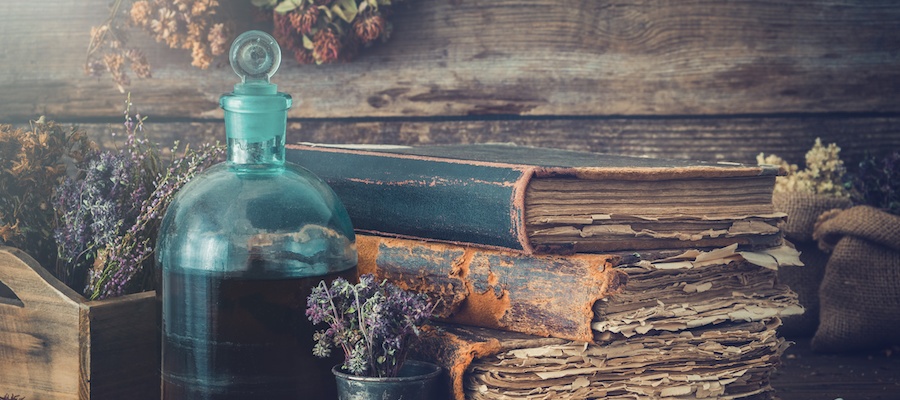
(Image Copyright: Natallia Khlapushyna / 123RF Stock Photo)
Books on Botany
Every herbalist should know some basic botany, especially if they’re interested in wildcrafting medicinal and edible plants. John Kallas’s book mentioned above is good for identifying specific plants, but here are a few more books on botany to add to your herbal library.
Botany in a Day: Thomas J. Elpel's Herbal Field Guide to Plant Families, by Thomas J. Elpel
To go deeper in your botanical education, you can’t go wrong with Botany in a Day. This herbal field guide to plant families in North America is designed to simplify the study of botany and provide a foundation of plant identification by the characteristics of plants by family and genus.
If you have an artistic bent, the HarperCollins Botany Coloring Book by Paul Young is a good companion.
Books for Learning Latin Names of Plants
Latin for Gardeners: Over 3,000 Plant Names Explained and Explored, by Lorraine Harrison
Anyone studying herbalism knows learning all those Latin names is challenging! Latin for Gardeners has over 3,000 Latin plant names defined with pronunciation guides for each term.
Those Latin words pack meaning and often tell us something about the species of plant. For example, if the second term in the binomial is majalis—as in Rosa majalis—it means, “flowering in May.”
This book also contains plenty of botanical illustrations and short essays on plant families and significant historical botanists.
The Sibley Guide to Trees, by David Allen Sibley
Another beautifully illustrated book! It contains 4,100 detailed paintings of trees of North America and their leaves, bark, needles, cones, fruit, flowers, and silhouettes. The illustrations detail the subtle similarities and differences among over 600 trees species with common and Latin names.
Over 500 maps show the complete range of both natural and cultivated species. I often pick this book up just to appreciate the paintings.
The #1 Book for the Home Herbalist
The Herbal Medicine-Maker's Handbook: A Home Manual, by James & Ajana Green
This is one go-to guide that I refer to often. The Greens’ book is a crash course in herbs essential for the home herbalist and instructions on the best way to prepare them in common remedies. This is a reference that belongs in every herbalist’s library.
Final Thoughts: What Are You Reading?
This is by no means a list of every herbal book I have, but I find myself referring to these favorites most often.
There’s always more to read! For me, these are the kinds of books I read and re-read. They’ll broaden and deepen your own herbal wisdom and knowledge. Read about herbs, use them, get into the garden, and get out into the forests and field. And don't forget to take a field guide with you!
What is your favorite book on herbal studies? Keep this list going in the comments!
Disclosure of Material Connection: I am the Herbal Medicine Department Chair at American College of Healthcare Sciences, the Institution that publishes this blog. However, all opinions are my own. This blog may contain affiliate links. I am disclosing this in accordance with the Federal Trade Commission’s 16 CFR, Part 255: “Guides Concerning the Use of Endorsements and Testimonials in Advertising.”
This article is for informational purposes only. It is not intended to treat, diagnose, cure, or prevent disease. This article has not been reviewed by the FDA. Always consult with your primary care physician or naturopathic doctor before making any significant changes to your health and wellness routine.
________________________
![]() ABOUT SCOTT STUART: Scott is the ACHS Herbal Medicine Department Chair and teaches herbal studies at American College of Healthcare Sciences. His love of herbal medicine, Chinese martial arts, and Taoist philosophy called him to change careers from journalism and photography to Traditional Chinese Medicine. Scott has completed a four-year Master's program in Acupuncture and Oriental Medicine at the Oregon College of Oriental Medicine in Portland, Oregon. Scott is a former Vice President of The Clackamas Center for Traditional Medicine (CCTM).
ABOUT SCOTT STUART: Scott is the ACHS Herbal Medicine Department Chair and teaches herbal studies at American College of Healthcare Sciences. His love of herbal medicine, Chinese martial arts, and Taoist philosophy called him to change careers from journalism and photography to Traditional Chinese Medicine. Scott has completed a four-year Master's program in Acupuncture and Oriental Medicine at the Oregon College of Oriental Medicine in Portland, Oregon. Scott is a former Vice President of The Clackamas Center for Traditional Medicine (CCTM).

